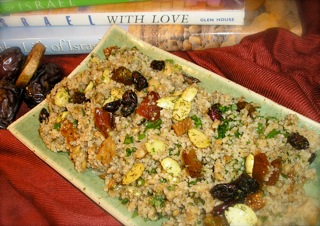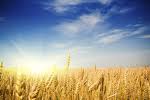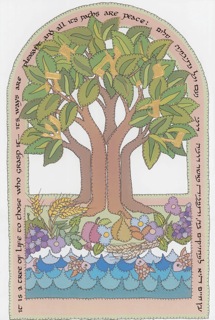|
bs"d Newsletter vol.1 issue 5 Queen in the Kitchen Tu b’Shevat, which we celebrate this Shabbat (January 29/30), is one of those “minor holidays” that kind of sneaks up on you. No extra shul time required, little preparation or learning in advance. Not so here. I was surprised to find out that in Israel it's sort of a "National Pride Day" with fruits of the land much in demand. So what's this Tu b’Shevat connection to Eretz Yisrael about? Here's something I learned that will give you some fruit for thought. How is the Land of Israel Unique? When the B’nei Yisrael are finally poised to enter the Land of Israel, Hashem first recounts all the good He has shown us in our 40 years in the desert: the well, the manna, our clothes, shoes and the Clouds of Glory. All this He did to prepare us for our ultimate goal, a Torah life in Eretz Yisrael. And how does He describe our destination? By highlighting seven items of produce: " a good land… a land of wheat and barley, of grape and fig and pomegranate; a land of oil-rich olive and sweet date." (Devarim 8:7-8) This is surprising. Why not mention Israel’s lush hills, her extraordinary lakes, the stunning mountains, valleys and waterfalls of the Galil or the breathtaking cliffs of the golden Negev? Her spectacular birds, curious animals, the clarity of the air? Instead, Hashem sets apart seven foods of from all the Land’s greatness to entice us toward our goal. Even more puzzling, these Seven Species do not make the Land of Israel unique; all seven also grow in many other places in the world. It must be that G-d’s focus on these particular seven means that they are more than mere embellishments to the gift of this “good Land.” Israel's Exceptional Produce The Land of Israel is unique for one reason: because G-d gave it to the Jewish people. Both the Jew and the Land are eternally intertwined. Indeed, the Baal Shem Tov’s approach is that that every Jew is regarded by G-d as "a cherished land," from which all types of good produce can grow. The Seven Species are exceptional. Each one expresses an innate trait of the Land and of the Jew, the inheritor of the Land. For instance, in the Beis HaMikdash, the Menorah always burned with pure olive oil. So to, the olive is indicative of our "pintele yid," our eternal light. Figs, because they continually produce in their growing season, show us we find sweetness in the continual review of our Torah learning. (next column) Try my Seven Species Talboulleh Salad for your Tu B'Shevat meal. In one dish you have all seven species. It's easy and beautiful.
Pomegranates are filled with luscious seeds representing our abundant desire for mitzvos. The characteristics of all Seven Species are intrinsic to the exceptional character of Eretz Yisrael and the Jew. They articulate the essential qualities that set us apart from all the other nations. Yet, in our desire to gain the world’s acceptance, we forget that it is our very uniqueness which protects us! When we cast ourselves as “a nation like all other nations,” the reckoning is severe. Hashem promises to lead us to the Land and even guarantees our military victory over the Canaanites. Still, He allows us to send men to spy out the nature of the land, its population and its produce. Their report is disastrous. “We are unable to go up against the people, for they are stronger than we,” (Numbers 13:31) they declare. To prove that a natural victory is impossible, the spies return with grapes, figs and pomegranates of massive proportion, food for giants whom we would have to conquer. We Are a Nation Conceived for Life in Israel It's true that a natural victory was impossible. But we forgot who we are--a nation conceived for life in Eretz Yisrael, the only place overseen directly by G-d rather than through intermediaries: "A Land that Hashem, your G-d, seeks out; the eyes of Hashem, your G-d, are always upon it." (Devarim 11:12).
Because of His great love for us, Hashem gave us a beautiful way to repent for our shunning His gift. It is Bikkurim, the offering of the first fruits of The Land. Hashem still promises to settle us in Israel in spite of our initial rejection! The mitzvah of Bikkurim was performed exclusively with the Seven Species: Wheat, barley, grapes, dates, figs, olives and pomegranates. Thus, the mitzvah of Bikkurim gave us the opportunity, using very fruits the spies used to condemn the Land, to express our complete love for it-the very fruits that tell us we are different!
The Meyan Shalosh blessing that we say after eating any of the Seven Species is exclusive to these particular foods. Interestingly, the entire body of this blessing centers not on the specialness of the species, but on our yearning for Israel, Jerusalem and the Beis HaMikdash.Why is this? This is because Israel is the only place where the intrinsic qualities of the produce of Israel, the Jewish People, can be realized in their full potential.
The Kuzari writes that to produce good fruit three conditions are needed: a good vine, a suitable location and proper care. The vine, he says, is the Jewish People, the suitable location, Eretz Yisrael and their proper care is the Torah. I'd really like your comments and suggestions. ~
|


